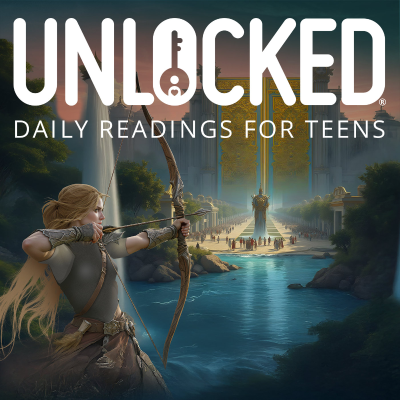
Unlocked: Daily Devotions for Teens
engelsk
Historie & religion
Prøv gratis i 14 dager
99 kr / Måned etter prøveperioden.Avslutt når som helst.
- 20 timer lydbøker i måneden
- Eksklusive podkaster
- Gratis podkaster
Les mer Unlocked: Daily Devotions for Teens
Unlocked is a daily teen devotional, centered on God’s Word. Each day’s devotion—whether fiction, poetry, or essay—asks the question: How does Jesus and what He did affect today’s topic? With daily devotions read by our hosts, Natalie and Dylan, and questions designed to encourage discussion and a deeper walk with Christ, Unlocked invites teens to both engage with the Bible and to write and submit their own devotional pieces.
Alle episoder
5466 EpisoderIn a Pit
READ: PSALM 103:4; ROMANS 8:38-39; COLOSSIANS 2:13-15; 2 PETER 3:8-13 [https://www.biblegateway.com/passage/?search=PSALM%20103%3A4%3B%20ROMANS%208%3A38-39%3B%20COLOSSIANS%202%3A13-15%3B%202%20PETER%203%3A8-13&version=NIV] Life digs a pit and throws me, kicking and flailing, inside. I hit the bottom hard. There’s no escape, so I call out, “Lord, save me! I’m not meant to exist in this pit. I know Your plan is good!” I sit down and wait for my Savior, expectant for His face to appear over the edge. Time passes, and I fidget, wondering why it’s taking Jesus so long to intervene. I know He heard me. I stand up. I hear noises! My eyes flit back and forth, expecting a rope or a hand. Instead, I see dirt from a shovel come flying into the pit. I duck my head just in time to protect my eyes. More scoops come until my head and shoulders are dusty and my nostrils twitch with oncoming sneezes. “Who’s up there?” I shout. Satan pokes his head over the edge and grins. “It’s me. Adding misery to what Life does. Fun, isn’t it?” Another scoop follows his words down to the bottom of the pit. I back myself against the dirt wall. I press my lips together, trying to keep my heart steadfast. I know my Savior loves me. But the shovelfuls don’t stop, and eventually, I snap. “Lord, if you’re not gonna get me out of here, could You at least bring me a shovel so I can throw some dirt back at him?” I shout. “Don’t You care that Satan’s winning?!” Jesus comes. All the way to the bottom. He has a board, and He begins using it to tamp the loose dirt. He sings the Song of Grace as He works. I frown. “Why are you down here? Can’t You get me out? Don’t You wanna thwart Satan’s dirt?” Jesus looks at me with love. “Trust Me,” He says. “It might look like Satan is winning, but here’s the secret. I am using his evil, feeble work to fill in the pit. He thinks he is destroying forever. But I am restoring things—even this very pit— using his evil intentions for good. When I am done tamping, we will walk out of the pit together on solid, level ground.” • H. K. Rausch • Today’s story is an allegory. Though we live in a world that has been broken by sin, Jesus came to save us through His death and resurrection. He has defeated all the powers of sin and Satan, and one day Jesus will return and make all things new and whole! Until then, we will experience suffering and hardship, but we can know that Jesus is right here with us in the midst of it. What kinds of struggles have you had lately? Consider taking some time to tell Jesus about them. • In addition to talking to Jesus, who are trusted Christians you can talk to about your struggles? And we know that in all things God works for the good of those who love him, who have been called according to his purpose. Romans 8:28 (NIV)
In a Pit
READ: PSALM 103:4; ROMANS 8:38-39; COLOSSIANS 2:13-15; 2 PETER 3:8-13 [https://www.biblegateway.com/passage/?search=PSALM%20103%3A4%3B%20ROMANS%208%3A38-39%3B%20COLOSSIANS%202%3A13-15%3B%202%20PETER%203%3A8-13&version=NIV] Life digs a pit and throws me, kicking and flailing, inside. I hit the bottom hard. There’s no escape, so I call out, “Lord, save me! I’m not meant to exist in this pit. I know Your plan is good!” I sit down and wait for my Savior, expectant for His face to appear over the edge. Time passes, and I fidget, wondering why it’s taking Jesus so long to intervene. I know He heard me. I stand up. I hear noises! My eyes flit back and forth, expecting a rope or a hand. Instead, I see dirt from a shovel come flying into the pit. I duck my head just in time to protect my eyes. More scoops come until my head and shoulders are dusty and my nostrils twitch with oncoming sneezes. “Who’s up there?” I shout. Satan pokes his head over the edge and grins. “It’s me. Adding misery to what Life does. Fun, isn’t it?” Another scoop follows his words down to the bottom of the pit. I back myself against the dirt wall. I press my lips together, trying to keep my heart steadfast. I know my Savior loves me. But the shovelfuls don’t stop, and eventually, I snap. “Lord, if you’re not gonna get me out of here, could You at least bring me a shovel so I can throw some dirt back at him?” I shout. “Don’t You care that Satan’s winning?!” Jesus comes. All the way to the bottom. He has a board, and He begins using it to tamp the loose dirt. He sings the Song of Grace as He works. I frown. “Why are you down here? Can’t You get me out? Don’t You wanna thwart Satan’s dirt?” Jesus looks at me with love. “Trust Me,” He says. “It might look like Satan is winning, but here’s the secret. I am using his evil, feeble work to fill in the pit. He thinks he is destroying forever. But I am restoring things—even this very pit— using his evil intentions for good. When I am done tamping, we will walk out of the pit together on solid, level ground.” • H. K. Rausch • Today’s story is an allegory. Though we live in a world that has been broken by sin, Jesus came to save us through His death and resurrection. He has defeated all the powers of sin and Satan, and one day Jesus will return and make all things new and whole! Until then, we will experience suffering and hardship, but we can know that Jesus is right here with us in the midst of it. What kinds of struggles have you had lately? Consider taking some time to tell Jesus about them. • In addition to talking to Jesus, who are trusted Christians you can talk to about your struggles? And we know that in all things God works for the good of those who love him, who have been called according to his purpose. Romans 8:28 (NIV)
Why God Wants You to Ask for Help
READ: PROVERBS 27:9; ECCLESIASTES 4:9-12; 1 JOHN 4:19 [https://www.biblegateway.com/passage/?search=PROVERBS%2027%3A9%3B%20ECCLESIASTES%204%3A9-12%3B%201%20JOHN%204%3A19&version=NLT] Sometimes it’s hard to share the thoughts and feelings weighing most heavily on our hearts. Maybe we’re struggling with depression, bullying, a parent’s divorce, the death or illness of a loved one, or the sins we are most often tempted by. We might feel embarrassed or ashamed that we feel the way we do. We might worry how others might react. We might even feel like we’re a burden to them when we tell them how we’re feeling. But God doesn’t want us to suffer alone! He gave us friends, family, teachers, and our church families to help us—in good times and in bad. Aaron supported his brother Moses’s arm when he was too tired to hold up his staff (Exodus 17:10-13). Jonathan protected his friend David from King Saul, who wanted to kill David (1 Samuel 18:1-5; 20:1-42). As Christians, we are meant to support, challenge, and encourage each other no matter what we’re going through—loving each other as Jesus has loved us (Matthew 28:20; John 13:34-35; 1 John 4:19). Maybe at church, you feel like you don’t belong. “Nobody knows or understands what I’m going through. I’d better just stay quiet.” But Christians aren’t a bunch of perfect people: they’re a bunch of people who are all in different places on their journeys to become more like Christ. Some might be at a high point in their lives, others at a low point, but everyone will face their own unique struggles sooner or later. You don’t have to be ashamed to have them. In fact, being open about them may encourage someone else to share their burdens too! We bless others when we let them help us. Purpose and special blessing are found in demonstrating the love of Christ as we “share each other’s burdens” (Galatians 6:2). Please don’t deny that privilege to those who care about you and want to help you! When we are refreshed and encouraged by the body of Christ, we find new strength to give the same gift of encouragement to others. • Jessica Kleeberger • What kinds of struggles or burdens have you been dealing with lately? Who is a trusted Christian in your life you could share them with—such as a parent or other family member, pastor, friend, or youth leader? • What are some ways we can help friends who are going through hard times, even if they might be reluctant to ask for help? How can this show Jesus’s love? Two people are better off than one, for they can help each other succeed. If one person falls, the other can reach out and help. Ecclesiastes 4:9-10 (NLT)
A Thief at Any Time
READ: PSALM 23; JOHN 10:10-18 [https://www.biblegateway.com/passage/?search=PSALM%2023%3B%20JOHN%2010%3A10-18&version=CSB] In college, I shared an apartment with a buddy. We lived in complete poverty: we owned a couch, a desk, a chair, and an old TV. Late one afternoon, I fell asleep on the floor. I heard some noise and assumed it was my roommate rummaging around. It wasn’t. A guy had broken in by slicing a hole through our bedroom screen. Even though I heard him, I pretended to sleep, which is a good thing since he carried a knife. I can’t imagine a more disappointed thief as he wandered through our sparse apartment, ultimately leaving empty-handed. Jesus describes a different thief—followed by a stark contrast—in John 10:10, saying, “A thief comes only to steal and kill and destroy.” Those are powerful words. Stealing. Killing. Destroying. The thief cares not about you or me. A thief will take what isn’t theirs and may harm others in the process. Satan, the greatest thief of all, wants your joy, peace, and even your very life. He hates God and the people He has created. But here’s the contrast. In verse 11, Jesus goes on to say that He is the Good Shepherd, and He is willing to lay down His life to protect the sheep. The sheep are His people—everyone who puts their trust in Him. He not only protects the sheep, but He has “come so that they may have life and have it in abundance” (verse 10). Sheep are very vulnerable to predators, but the Good Shepherd provides both safety and abundant life, safeguarding them from thieves who want their death. Jesus accomplished all this by laying down His life for His sheep, providing the ultimate sacrifice at the cross. He gave His life so the thief would not take ours. A hired hand might run, but a real shepherd will safeguard his sheep, even to the point of death. And because Jesus rose from the dead, we can rest in the promise of the Good Shepherd: that He will not lose a single sheep (John 6:39; 10:28-30). • Mike Hurley • Jesus isn’t the only one who talks about sheep and a shepherd as a metaphor for people and God—we see this comparison throughout the Old Testament as well. In fact, all these passages point forward to Jesus. Why do you think God describes our relationship to Him this way? • Jesus offers us life and peace through His death and resurrection—while sin and Satan only offer us death. To learn more about how Jesus saves us from sin and death, check out our "Know Jesus" page. [Jesus said,] “A thief comes only to steal and kill and destroy. I have come so that they may have life and have it in abundance.” John 10:10 (CSB)
One Step at a Time
READ: PSALMS 37:23; 119:105, 133; MATTHEW 28:16-20; ACTS 18:1-4 [https://www.biblegateway.com/passage/?search=PSALMS%2037%3A23%3B%20119%3A105%2C%20133%3B%20MATTHEW%2028%3A16-20%3B%20ACTS%2018%3A1-4&version=NIV] “What are you going to do when you grow up?” While this question can be fun to ask a small child, it becomes more stressful as you inch closer to graduation. Everyone seems to expect you to have an answer—as though there is only one “right answer.” Perhaps you find yourself exhausted with all the questions, feeling a mounting anxiety about “getting it right.” Perhaps you have thoughts, but you aren’t feeling “called” to a specific career. Maybe you’ve known since you were nine what you want to be. Maybe you have no idea or too many ideas! Take a breath. It’s okay. Sometimes, a career is just a job—funding and fueling the passions God will give you in your personal time. Always, it is a mission field, to reach people with the love of Jesus who may not know Him yet. But a career is not always static. You may start in one field or one position, and branch into one or more different areas as time goes on. Even Jesus wasn’t pigeonholed into one job. Fully God and fully human, He probably worked as a carpenter first; then as His public ministry began, He did the work of a teacher, healer, and exorcist, to name just a few of His roles. The apostle Paul was a teacher, a writer, and a tent maker! Personally, I worked as a criminologist and a social worker before becoming a stay-at-home parent and freelance creative. My path has not been what I expected, but it’s been filled with the presence and empowerment of God, growing and stretching me continuously. You don’t have to know what you’re going to do “for the rest of your life.” You’re free to focus on the next step. You can trust the Holy Spirit to direct you—to whisper behind you, “This way!” every time you’re faced with a crossroads—and to help you be open to change (Isaiah 30:21). Remember, Jesus will walk with you every step. • Abigail Aswegen • Consider taking some time this week to talk to a few trusted Christian adults about what they planned to do when they were your age. You can ask if their plans turned out the way they expected, and how they saw God show up in the midst of it. • If we’ve put our trust in Jesus, our most important identity is “beloved child of God.” Any jobs we do can never take that place. How does this identity free us to pursue whatever path God calls us to? So whether you eat or drink or whatever you do, do it all for the glory of God. 1 Corinthians 10:31 (NIV)
Velg abonnementet ditt
Premium
20 timer lydbøker
Eksklusive podkaster
Gratis podkaster
Avslutt når som helst
Prøv gratis i 14 dager
Deretter 99 kr / måned
Premium Plus
100 timer lydbøker
Eksklusive podkaster
Gratis podkaster
Avslutt når som helst
Prøv gratis i 14 dager
Deretter 169 kr / måned
Prøv gratis i 14 dager. 99 kr / Måned etter prøveperioden. Avslutt når som helst.















































